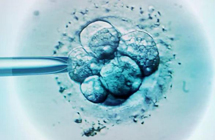科学家找到决定怀孕成功的关键基因!
|
Scientists have edited human embryos for the first time in the UK to discover a “master gene” that underpins successful pregnancies. The “game-changing” research promises improved IVF outcomes and a breakthrough in understanding why so many pregnancies fail. The Government-funded investigation, undertaken by the Francis Crick Institute, is the first to prove that gene editing can be used to study the genetic behavior of human embryos in their first few days of life.
By removing a gene which produces a protein called OCT4, the team discovered it was crucial to a viable pregnancy. As well as its potential for more successful IVF, the discovery heralds a transformation in understanding the fundamental causes of infertility and miscarriage. Approximately one in four couples are affected by fertility problems, and women under 35 currently have just a 32.2 percent chance of a live birth from one round of IVF. The odds decrease to 27.7 for women aged 35 to 37, and to 20.8 percent for those aged 38 and 39. Dr Kathy Niakan, who led the research, said: “One way to find out what a gene does in the developing embryo is to see what happens when it isn’t working. “Now we have demonstrated an efficient way of doing this, we hope that other scientists will use it to find out the roles of other genes. “If we knew the key genes that embryos need to develop successfully, we could improve IVF treatments and understand some causes of pregnancy failure.” The scientists, who studied 41 human embryos donated by IVF patients, used the gene-editing tool Crispr/Cas9 to make precise cuts in DNA and deactivate OCT4. They found OCT4 appeared to be necessary for an embryo to become a blastocyst, a tiny ball of 200 cells that arises a week after conception and marks a key point in embryonic development. Only when an embryo successfully reaches the blastocyst stage does it stand any chance of implanting in the womb. The study, published in the journal Nature, found fewer than a fifth of the test embryos reached the blastocyst stage without OCT4. |









